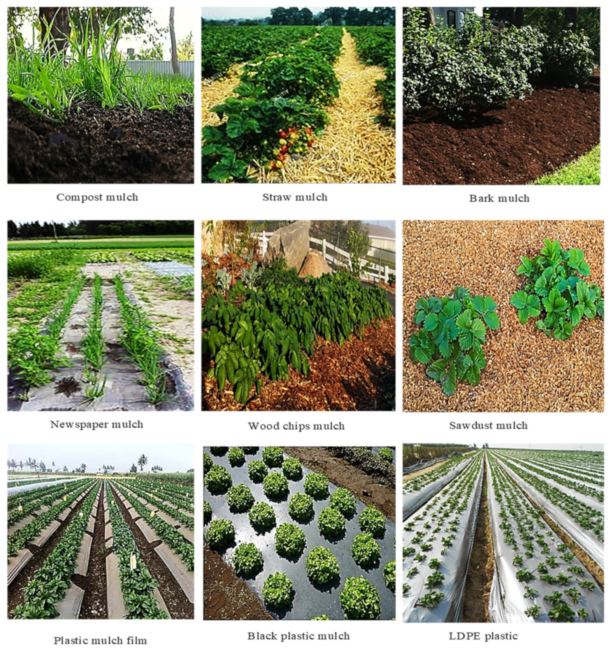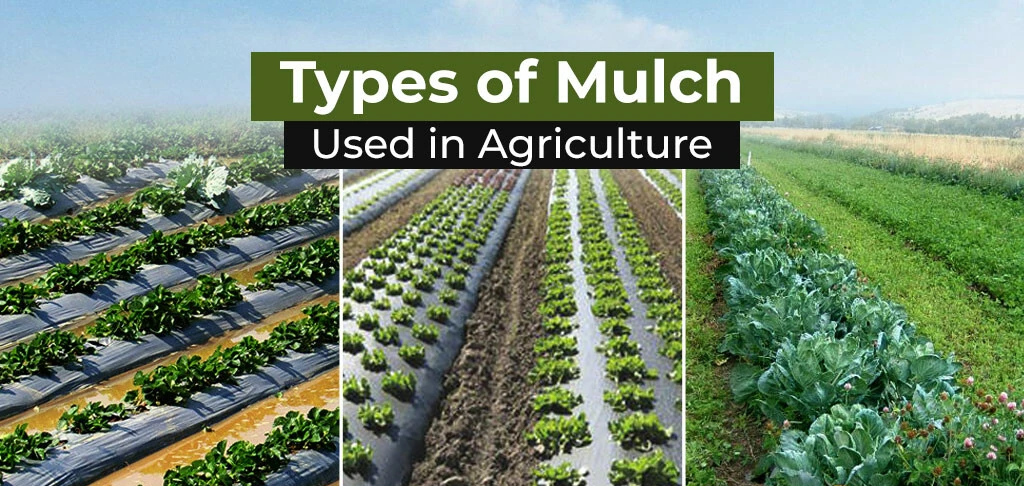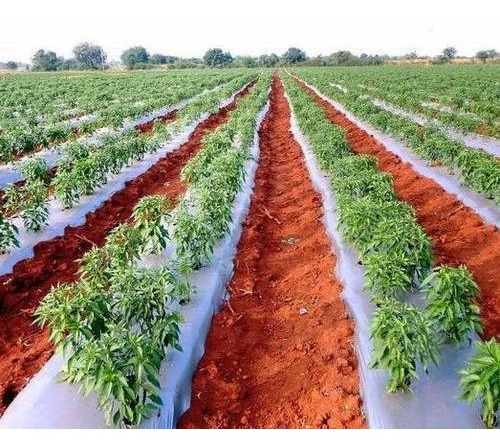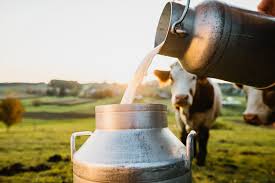What is Mulching and Importance of Mulching
Mulching can be defined as the process of covering the soil surface around the plants to create congenial conditions for the crop growth. This may include moisture and soil conservation, temperature moderation, salinity and weed control etc. It exerts a decisive effect on earliness, yield and quality of the crop.
In the ever-evolving landscape of agriculture, one practice that has gained widespread recognition for its manifold benefits is mulching. So, what is mulching in agriculture? Mulching, meaning the application of a protective layer of material on the soil surface, plays a pivotal role in promoting soil health, conserving water, and enhancing overall crop productivity.
Mulching in Agriculture – What is Mulching?
Mulching meaning in agriculture involves the strategic placement of organic or inorganic materials over the soil surrounding crops. This protective layer serves various purposes, ranging from weed suppression to moisture conservation.
The essence of mulching lies in its ability to create a conducive environment for plant growth while simultaneously mitigating the challenges posed by external factors.
Types of Mulching/Mulch Materials
The mulch and more materials that may be used for laying over the soil may be organic plant residues, insert material like pebble etc. or and synthetic materials like plastics. Every material has got its merits and demerits.
Read Also: How to Use Mulches to Control Weeds on your Garden
Advantages of Mulching/Importance of Mulching

Now let us discuss further to understand and answer the question what are the important of mulching and the reasons for mulching in agriculture.
Do you wish to know what is mulching and its importance? Then below are some of the major mulching importance as we explain the five importance of mulching including the first 4 importance of mulching;
1. Moisture Conservation: Mulching Improves Moisture Conservation
One of the key aspects of mulching in agriculture is its role in moisture conservation. The importance of mulching becomes evident as the protective layer minimizes water evaporation from the soil, ensuring that the crops receive a consistent water supply. This becomes particularly crucial in arid regions or during dry seasons, where water scarcity poses a threat to crop yield.
Plastic film with its moisture barrier properties does not allow the soil moisture to escape Water that evaporates from the soil surface under mulch film, condenses on the lower surface of the film and falls back as droplets.
Thus moisture is preserved for several days and increases the period between two irrigations. Plastic mulches also aid in evenly distributing moisture to the soil which reduces plant stress.
Savings in water is one of the greatest advantage with plastic mulch and such savings are found to vary from 20% to as high as 75%. The savings in water are more pronounced in dry areas.
2. Weed Suppression: Mulching as a source for Weed Control
As every plant requires a process of photosynthesis for generation of food, which requires sunlight, on using of plastic mulch film the weed plant which will be below the plastic mulch sheet, the sheet does not allow the sunrays to pass through it, as our film has a unique quality of reflecting back the sunlight, which will not allow the weed to grow.
Mulching acts as a natural barrier against the growth of unwanted weeds. By covering the soil, it prevents weed germination and inhibits their ability to compete with crops for essential nutrients and sunlight. This, in turn, reduces the need for herbicides and manual weeding, emphasizing the reasons for mulching in agriculture and promoting sustainable and eco-friendly farming practices.
3. Temperature Regulation
The importance of mulching extends to temperature regulation. Mulching aids in regulating soil temperature by acting as an insulating layer. It prevents extreme temperature fluctuations, providing a more stable and favorable environment for plant roots.
This is particularly beneficial in regions with erratic weather patterns, highlighting the importance of mulching in agriculture where maintaining optimal soil temperature is crucial for crop success.
4. Soil Enrichment
Mulching is not just about protection; it’s about soil enrichment. Organic mulches, such as compost or straw, gradually break down over time, enriching the soil with essential nutrients.
This natural decomposition process enhances soil structure, fertility, and microbial activity, emphasizing the importances of mulching and promoting robust plant growth and resilience against diseases.
5. Erosion Control
The importance of mulching in agriculture is underscored by its role as a protective shield against soil erosion. Mulching serves as a buffer, preventing rainwater from directly impacting the soil surface and carrying away valuable topsoil.
This erosion control is particularly vital on sloping terrain where runoff can be a significant concern, further emphasizing the reasons for mulching in agriculture.
Other Importance of mulching include;

6. Reduction in the Cost of Fertilizer
Basically water has the property to go deep into the soil also known as leaching property, where as the roots cant go too much deep into the soil, when fertilizer get dissolved in the water because of the leaching property there is a huge wastage of fertilizer, the use of plastic mulch along with drip irrigation allows the dissolved fertilizer not to go deep into the soil and allows timely and evenly distribution of nutrients to the plant, which helps the plant to grow faster and healthier.
Based on the above concept fertilizer use efficiency by the plant will be more than 95%, hence there will be an approximate saving of 50% in the cost of fertilizer.
7. Quality Produce
Plastic mulches avoid the ripening fruits from direct soil contact. There by decreases fruit rot as well as keeps the fruit and vegetables clean. This gives quality produce and better marketability.
Read Also: The Difference Between Manure and Fertilizers and How they Work
8. Mulching is useful for Reduction in Soil Compaction
The plastic mulch covering the soil decreases the crusting effect of rain and sunlight. The reduction in weed quantity means a decreased need for mechanical cultivation. Weed control between beds of plastic can be done using directly applied herbicides and through mechanical means.
The soil underneath the plastic mulch stays loose and well aerated. This increases the amount of oxygen in the soil and aids in microbial activity. There by more active root zone will be developed.
9. Reduction in Root Damage
The use of plastic mulch creates a practically weed free area around the plant, removing the need for inter cultivation except between the rows of plastic.
Root damage associated with inter cultivation is therefore eliminated. Due to these factors, the use of plastic mulch can lead to an improvement in the overall growth of the plant.
10. Chimney Effect
Carbon dioxide (CO2) is slightly heavier than air during night. The CO2 tends to stay low near the plant before it finally defuses into the air. The green leaves of all plants feed from CO2. They take out the carbon and release the oxygen.
Based on the above concept some of the CO2 will be preserved under the mulch film during the night, during the day time because of heat the CO2 will become lighter and goes upwards through the mulch whole at the stem of the plant, there by reaching the leaves above, which helps effective photosynthesis.
11. Mulching helps to control Soil Erosion
Ideally soil erosion should be less than 4 to 5 tons/ha/year. The reduction of water runoff and erosion is one of the greatest advantages of having a plastic mulch by intercepting raindrops, hence the valuable fertile soil( humus layer) will be protected.
Read Also: Time and Methods of Fertilizer Application on Crops
12. Early Production
The use of plastic mulch alters soil temperature. Mulch applied to the soil intercept sunlight warming the soil allowing earlier planting as well as encouraging faster growth early in the growing season.
White mulch reflects heat from the sun effectively reducing soil temperature. This reduction in temperature may help establish plants in mid-summer when cooler soil might be required.
13. Salinity Management
Salinity management, a critical aspect of sustainable agriculture, finds a valuable ally in the practice of mulching. Mulching plays a pivotal role in addressing salinity issues within agricultural soils by providing a protective barrier against excessive salt accumulation.
The importance of mulching in salinity management lies in its ability to create an optimal environment for crops, mitigating the adverse effects of high salt concentrations.
Mulching acts as a shield, preventing salt-laden irrigation water from directly contacting the soil surface. By forming a protective layer, mulch reduces the evaporation of water, minimizing the upward movement of salts through capillary action. This protective barrier effectively hinders salt accumulation at the root zone, safeguarding the delicate balance required for plant growth.
Furthermore, organic mulches contribute to salinity management by enhancing soil structure and promoting beneficial microbial activity. As these mulches decompose over time, they release organic matter into the soil, fostering improved water retention and drainage. This organic enrichment counteracts the detrimental effects of salinity, creating a more hospitable environment for crops to thrive.
In regions where salinity poses a persistent challenge, the integration of mulching into agricultural practices becomes not just a beneficial strategy but a necessity.
The dual benefits of moisture conservation and weed suppression provided by mulching complement its role in salinity management, offering farmers a holistic approach to cultivate resilient and high-yielding crops in saline-prone areas.
Embracing mulching as a salinity management tool is a testament to the sustainable and proactive measures that farmers can employ to ensure the long-term health and productivity of their fields.
14. Mulching as a source for Pest Control
Plastic mulches like silver have the property to repellent the sucking pests like white flies, moreover plastic mulches will reduce the effect of soil born pathogen.
15. Soil Micro-climate
Mulches create a micro environment which alters plant growth and development. Plastic mulches affect plant microclimate by retaining soil moisture and changing root-zone temperatures and the quantity and quality of light reflected back to the plants there by altering the soil energy balance and restricting soil water evaporation, benefiting the plant growth and give better yield.
Precautions in Mulch Layering

• Do not stretch the film very tightly. It should be loose enough to overcome the expansion and shrinkage conditions caused by temperature and the impacts of cultural operation.
• The film should not be laid on the hottest time of the day, when the film will be in expanded condition.
Recommended Width for Mulching
This depends upon the inter row spacing. Normally a one to one and half meter width film can be easily adapted to different conditions.
Mulch Laying Techniques
The following mulch laying techniques should be used;
1. Mulching materials should be laid on a non-windy condition.
2 The mulch material should be held tight without any crease and laid on the bed.
3 The borders (10 cm) should be anchored inside the soil in about 7-10 cm deep in small furrows at an angle of 45°.
Mulch Colours Effect

1. Black color: This is the most popular color used in crop production, especially for weed control. As a blackbody absorber, this plastic absorbs most incident solar radiation, including visible, infrared and ultra-violet light.
2. Clear color: It has been used in solarizing or disinfecting the soil in order to reduce soil borne diseases and some weeds. In such cases the soil must remain covered for several weeks during the hot part of the summer s as to achieve sufficiently high temperatures for solarization.
3. White color: In this case, light is reflected back into the atmosphere or the plant canopy, resulting in slightly cooler soil temperatures. White plastic mulches can be used to establish crops in the summer, when a reduced soil temperature might be beneficial. Coextruded white on black plastic mulch helps cool the soil by way of white colour while controlling weeds by way of black color.
4. Silver/Aluminum color: Reflective silver or aluminum mulches also give cooler soil temperatures. They tend to repel aphids, which could serve as vectors for various viral diseases.
Read Also: Amazing Reasons why we must use Rabbit Poo (Manure) for our Soil and Crops
5. Red color: Red plastic mulch has been reported to increase tomato yields and quality by various scientists, while others have reported a reduced severity of early blight in tomatoes. It also has been shown to increase yields of strawberry, honeydews, muskmelons and zucchini.
In addition, it has been shown to significantly increase soil temperatures. Not all red colors are the same, however, and results have not been consistent.
Other colors include: Blue, orange, or yellow mulches reflect different radiation patterns into the canopy of a crop, thereby affecting photosynthesis and/or plant morphogenesis, and can increase early yields, as was the case with red mulch.
The colors of mulching can also affect the behavior of certain insects. Yellow and, to a lesser degree, orange surfaces attract the green peach aphid.
Mulches with an aluminum or silver surface color have been used to repel certain aphids and reduce incidence of aphid-borne viruses in summer squash plantings. Such mulches might be used in a field to grow catch crops to pull insects away from other crops.
Blue-colored mulches have been shown to increase zucchini and honeydew yields. More research needs to be conducted to determine the effects of these colors on plant growth, yields, earliness and pest resistance.
Wave length-selective mulches
These mulches selectively absorb Photosynthetically Active Radiation (PAR), while transmitting solar infrared radiation, also called infrared-transmitting (IRT) mulches, they help control weeds and exhibit improved soil-warming characteristics, although generally not as well as clear plastic. Colors range from blue-green to brown.
In conclusion, the significance or important of mulching in agriculture cannot be overstated. This simple yet effective technique contributes to sustainable farming practices by addressing various challenges faced by modern-day farmers. From moisture conservation to weed suppression and soil enrichment, the benefits of mulching are far-reaching.
Embracing the concept of mulching is not just a choice; it is a strategic investment in the long-term health and productivity of agricultural ecosystems. I believe this article has been able to answer all your questions in relation to understanding what is the importance of mulching in agriculture.
Read Also: 4 Steps to help an Orange Tree Produce Sweet Oranges










It is a very useful blog and very important information about Mulch.
Thank you so much and we are glad that you find our article very helpful
Controlling erosion using mulch definitely sounds extremely useful. This is because our area is pretty dry in comparison with every other area, and I want to make sure we can still grow healthy plants and vegetables here. To do that, I’ll take your advice and look for a mulch provider that can give us the supplies we need.
Now I understand why farmers get mulching services since it is beneficial to mitigate weed production that affects crops negatively. This is relevant to know since we want to start planting vegetable crops in the extra land we owned. I would now also have to consider the services we need to hire to maintain this kind of plantation.
That’s great and I’m glad you find the article useful!